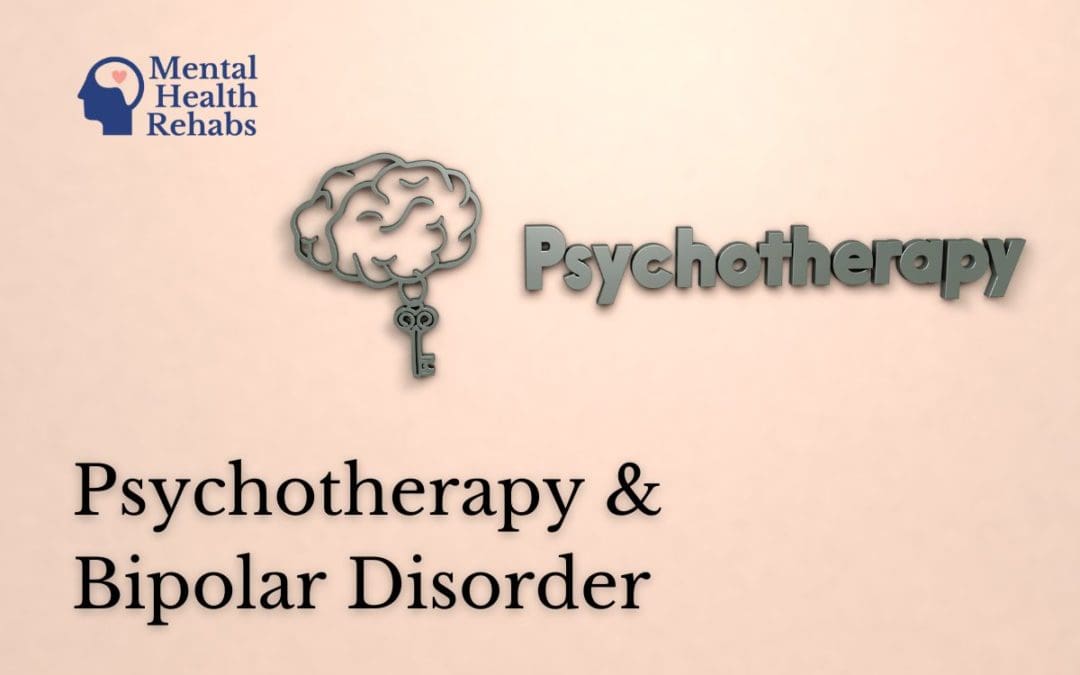If you’re familiar with what bipolar disorder is–a mental illness that causes extreme mood swings that cycle between dramatic highs and lows which can result in sudden and extreme changes in behavior, mood, cognitive ability, energy levels, and more–it might be hard to believe that talking to a therapist could be useful to someone living with this condition. When a mental illness is causing a person to think, say, and do things they normally wouldn’t do (and are often immensely disruptive to their everyday lives and wellbeing), the first course of action that immediately comes to mind is a pharmacological one.
However, it’s not enough to simply take some medication to treat bipolar disorder. Research has shown that a pharmacotherapy-only approach has dismally low rates of success and those patients face high rates of recurrence, residual symptoms, and other psychological issues. Learn why psychotherapy is useful for treating bipolar disorder, the different types of therapy for bipolar disorder, and how it works.
What is the Role of Psychotherapy in the Treatment of Bipolar Disorder?
Psychotherapy or “talk” therapy might not seem the obvious choice when it comes to effective therapeutic interventions for bipolar disorder. However, it’s been found to be highly effective for improving a person’s functioning in day-to-day life and to make this sometimes debilitating mental illness much more manageable, and reducing rates of hospitalization and relapse.
One of those means is just through education, teaching others about their condition and recognizing the various aspects of it. Psychotherapy can help people cope with the emotional burden of mental illness like understanding how their actions affect others or improving their own self-image, as well as reducing how often bipolar disorder episodes occur. Further,it can significantly improve a patient’s likelihood of taking their medication (a common challenge in bipolar disorder treatment)–a vital aspect for effectively managing bipolar disorder.
Psychotherapy is such an integral part for long-term success in treating bipolar disorder, a mental health that never fully goes away.
Recognizing and Dealing with Bipolar Episodes
A big part of learning to live with bipolar disorder means recognizing when you’re experiencing mania or depression. Psychotherapy can help these individuals knowing how to effectively manage the sometimes harmful or destructive feelings or behaviors that can come with them due to
Improved Self Image
Reduce the Triggering of Bipolar Episodes
The primary trigger of the condition’s defining characteristics–the drastic cycles between depression and mania–and is stress. Learning how to control stress can go a long way in minimizing the frequency of bipolar cycles, and thus, reducing the other negative consequences that arise from them.
Identify other Mental Health Issues
Further, psychotherapy can play a vital role in diagnosing other simultaneously occurring mental illnesses. It’s not uncommon for individuals to have anxiety, a personality disorder, or possibly an eating disorder. To make matters even more difficult, approximately 60% of individuals with bipolar disorder also have a substance abuse issue which can increase their risk of developing another mental illness even higher.
Therapeutic Interventions for Bipolar Disorder
There are several types of therapy for bipolar disorder. One popular option is cognitive behavioral therapy (CBT) which focuses on identifying and modifying a person’s negative or harmful patterns of thinking. CBT interventions for bipolar disorder can help a person identify what triggers their bipolar episodes as well as coping mechanisms when encountering those situations. This approach is practical and solutions-focused and prepares the individual for facing circumstances that might trigger a bipolar episode.
Another type of psychotherapy commonly used to treat bipolar disorder and other mood disorders is interpersonal and social rhythm therapy or IPSRT for short. But put down your dancing shoes, social rhythm therapy isn’t about moving your body or interacting with others, but rather a person’s circadian rhythm. IPSRT focuses on stabilizing your daily routines such as your sleep schedule, eating, and exercise routine.
Family-focused therapy does not directly help the individual to manage their condition. As its name suggests, it focuses on fixing the often estranged relationships between the bipolar disorder individual and their loved ones. Doing so can restore the person’s social support group, which is invaluable when dealing with illnesses of any kind. Additionally, learning how to heal damaged relationships can improve their overall functioning in social situations.
Finding Treatment for Bipolar Disorder
Although advancements in medicine have led to the creation of many effective prescription drugs for treating mental illnesses including bipolar disorder, that’s only half the battle. Successfully managing bipolar disorder—or most types of mental illness for that matter—will almost always involve both pharmaceutical drugs and some form of counseling. Find a mental health rehab near you to speak with a professional and discuss the best course of action for you or your loved one who’s struggling with bipolar disorder.

